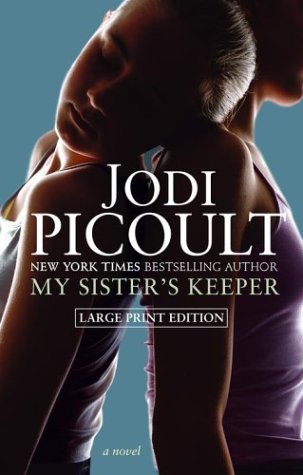All Nonfiction
- Bullying
- Books
- Academic
- Author Interviews
- Celebrity interviews
- College Articles
- College Essays
- Educator of the Year
- Heroes
- Interviews
- Memoir
- Personal Experience
- Sports
- Travel & Culture
All Opinions
- Bullying
- Current Events / Politics
- Discrimination
- Drugs / Alcohol / Smoking
- Entertainment / Celebrities
- Environment
- Love / Relationships
- Movies / Music / TV
- Pop Culture / Trends
- School / College
- Social Issues / Civics
- Spirituality / Religion
- Sports / Hobbies
All Hot Topics
- Bullying
- Community Service
- Environment
- Health
- Letters to the Editor
- Pride & Prejudice
- What Matters
- Back
Summer Guide
- Program Links
- Program Reviews
- Back
College Guide
- College Links
- College Reviews
- College Essays
- College Articles
- Back
My Sister's Keeper
Jodi Picoult begins My Sister's Keeper by telling us Anna Fitzgerald's purpose in life—to save her older sister, Kate. Kate Fitzgerald was diagnosed with a rare case of leukemia when she was 3. Her parents decided to have a test tube baby, Anna, to serve as an organ and tissue donor for her sister. Whenever Kate needed something like bone marrow, or blood, it was Anna's time to donate. But when Kate needs a new kidney, Anna refuses for the first time and retains renowned lawyer Campbell Alexander to get control over her body.
Anna's decision sends the family into chaos. During the trial, Anna goes against her mom, Sara, who is asking Anna to donate her kidney and save Kate's life “one more time.” Alexander represents Anna for free and argues that Anna, who has spent almost as much time in the hospital as Kate, has never been asked whether she wanted to be a donor.
Throughout the story Anna has mixed feelings about her decision not to donate. She doesn't even tell Alexander the precise reason for refusing to save her sister until the end, where the unexpected twist comes in (my absolutely favorite part of the book).
When I read My Sister's Keeper, I felt as if I knew each character because Picoult tells the story from the perspective of each character. I was blown away by Sara, who happens to be exactly like my mom. They're both aggressive in their actions and speech, and they stress out over little things. For a time, my mom was too focused on my little sister, who has cerebral palsy, to pay much attention to anything else.
Then there's Jesse, my favorite character because I can relate to his personality. He's the child who plays with fire to get attention and turned to drugs and cigarettes. I feel like I'm much like him in the way we thirst for attention from everyone, especially our parents.
I highly recommend reading My Sister's Keeper because the characters are realistic and relatable, it has sarcastic dialogue, and it's ingeniously plotted so that it touches on many controversial issues like relationships between siblings and couples, family courts, test-tube babies and control over one's body. It was intense reading Picoult pour her thoughts into these controversies and it definitely helped me know that I'm not the only one who can't answer these questions.
Similar Articles
JOIN THE DISCUSSION
This article has 0 comments.

